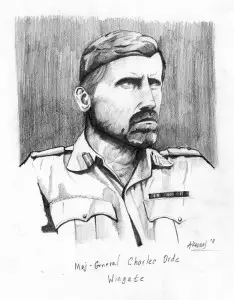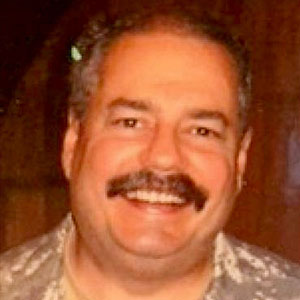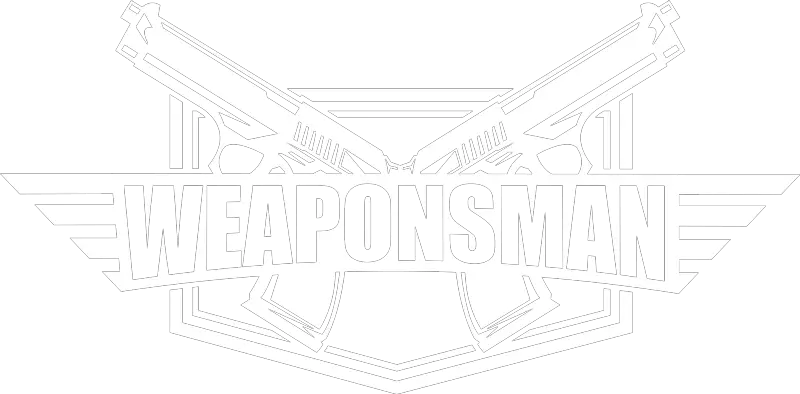
Orde Wingate — this sketch, from a contemporary photograph, is from this excellent site which discusses the Chindit controversies.
Max Boot has a massive, but not ponderous, article on the early Special Operations genius Orde Wingate in the Weekly Standard today. Wingate, Boot writes, is forgotten today, except in Israel where his Christian-tinged Zionism made him a friend for life and beyond. This is not exactly true, because Wingate is still remembered,loved, and studied in the Special Forces and SOF world. In Boot’s conventional military, men like Wingate are not merely ignored and forgotten, but actively opposed and undermined. It’s easy to see why:
“Popularity,” Wingate believed, “is a sign of weakness.” Considered by his peers to be either a “military genius or a mountebank” (opinions differed), he had been locked in an unceasing war against his superiors from his earliest days.
Even as a young cadet at the Royal Military Academy, Woolwich, he “had the power,” recalled his best friend, “to create violent antagonisms against himself by his attitude towards authority.” Later, as a junior officer, Wingate was known to begin meetings with generals by placing his alarm clock on the table. After it went off, he would leave, announcing, “Well, gentlemen, you have talked for one hour and achieved absolutely nothing. I can’t spend any more time with you!”
Wingate’s first rebellion was against the stifling religious atmosphere in which he was raised. He was born in 1903 to a father who was a retired Indian Army colonel with a devotion to a fundamentalist Protestant sect called the Plymouth Brethren. He and his wife brought up their seven children, including “Ordey” (his family nickname), in what one of his brothers called a “temple of gloom,” with prayer mandatory, frivolity forbidden, and “fears of eternal damnation” ever present. By the time Orde arrived at Woolwich, to train as an artillery officer, he had left the Plymouth Brethren, but he never lost his religious outlook. For the rest of his life he would be deeply influenced by the Bible, on which he had been “suckled” and which a friend said “was his guide in all his ways.” Another legacy of his childhood was that he developed a violent aversion to being regimented. At Woolwich he was in constant trouble, and he formed a low opinion of the “military apes” who tried to discipline him.
After graduation he learned Arabic, and in 1928 he joined the British-run Sudan Defense Force as an officer overseeing local enlisted men. He battled elusive gangs of slave traders and poachers within Sudan, learning the hit-and-run tactics he would employ throughout his career. He also developed many of his unconventional habits, such as wearing scruffy clothing (“his socks were very smelly and all in holes,” a subordinate later noticed), subjecting himself to great danger and discomfort, and receiving visitors in the nude. (He would become notorious for briefing reporters in his hotel room while “brushing his lower anatomy with his hairbrush.”) Other Wingate trademarks: a pith helmet, which he wore in the manner of a nineteenth-century explorer; an alarm clock, which he carried (he claimed “wrist watches are no damned good”); raw onions, which he munched like apples because of their supposedly salubrious properties; and a beard, which he grew from time to time in contravention of the King’s Regulations, which permitted only a mustache.
While returning home on a steamship from the Sudan in 1933, he met an Englishwoman, Ivy Paterson, and her 16-year-old daughter, Lorna. Ivy noted Wingate’s “medium height” (he was five feet six inches tall), the “forward thrust” of his head, and his “beautiful hands.” But his most impressive feature was his eyes: “Rather deep set, and of a periwinkle blue, they were the eyes of a prophet and a visionary. . . . [I]n their fire and intensity, one was aware of the unusual force of his personality.” That impression was reinforced when she heard Wingate hold forth in what another listener described as a “sandpaper voice” (“like the grating of stone against stone”) on almost every “subject under the sun”—including his love of Beethoven and his dislike of “the wireless,” as radio was then known. “He spoke brilliantly. But he could also be very quiet and silent for long periods.”
Ivy’s daughter, Lorna, was instantly smitten. Orde was 30 years old and already engaged, but he, too, fell in love with this winsome schoolgirl. They married two years later shortly after her graduation from high school. His former fiancée was devastated but remained so devoted to Orde that she never married, because she felt no other man could match him. This was evidence of the strong devotion that Wingate could instill to counterbalance the antipathy he so often engendered.
via What Wingate Wrought | The Weekly Standard.
While Boot writes pungently and succeeds well in giving you something of the man in that excerpt, you have to read the whole profile to get a sense of the man, and his unconventional career. Rather than commanding conventional units, Wingate spent his career commanding natives in the Anglo-Egyptian Sudan; organizing the Special Night Squads, a company-sized Anglo-Jewish element that operated in small patrols (and not coincidentally, trained a generation of early Haganah and IDF leaders); the Gideon Force, an Anglo-Ethiopian adventure that overthrew Mussolini’s empire in Abyssinia; and the unit for which he is most well-remembered in the US, the Chindits of Burma.
In each of these operations, natives adequately trained, organized and stiffened by British support were able to self-protect and in most cases self-liberate. (In the case of the Special Night Squads, they even did this while opposed by the British government and most of the British Army in Palestine, who supported the Arabs and disparaged the Jews). Each of these was, and is, a model of Special Forces unconventional warfare, and probably deserves book-length treatment (in some cases, like the Chindits and the SNS, they have had it).
In fact, Special Forces, which share the ethos and largely the heritage of Wingate’s various unconventional forces, is a unique place where the soldier who excels in the conventional army can excel further (not coincidentally, its first founders came from the “strac” Airborne Infantry of the fifties), but more often, the high-functioning misfit and loner can be redeemed. Some SF men would be great in a line unit, but the greatest SF men would be disruptive over there.
Like Orde Wingate. This is absolutely a Read The Whole Thing™ profile. Boot (who we daresay has read as many books about Wingate as we have) simply nails the guy and his importance in the SF/SOF firmament.

Kevin was a former Special Forces weapons man (MOS 18B, before the 18 series, 11B with Skill Qualification Indicator of S). His focus was on weapons: their history, effects and employment. He started WeaponsMan.com in 2011 and operated it until he passed away in 2017. His work is being preserved here at the request of his family.

3 thoughts on “The Great Wingate”
Scruffy clothes and beard? Definitely precursor to SF! 😉 Actually, even low-speed types like me were allowed that in the IDF, so now I know who to thank.
Thanks for posting this. Wingate is indeed an influential and fascinating personality in the development of unconventional and small unit warfare. He is honored and remembered in many places in Israel, with quite a few institutions named for him. As you noted, his influence on the development of the IDF was really quite pervasive, and certainly part of the IDF’s predilection for nighttime activity among other things.
Really, most of the credit goes to Boot. I’d expect an IDF vet like you or an SF vet like me (especially one with time on the historically-savvy operations side) to know about Wingate, but Boot is a Marine, for crying out loud.
The post linked in the photo is well worth reading, some of Wingate’s men were misfits to an even greater extent than he. In fact the whole site is most excellent. Very unflattering (verbal) portrait of Stilwell. His son was an SF officer, well regarded, was traveling between USA and RVN and his plane went missing.
The article was a good read. I commented to Mrs. Medic how just about everybody in Israel (at least my generation and younger) knows something about Wingate – but we are largely ignorant of the man’s larger career outside/after Mandatory Palestine. And we all know Wingate as the Christain Zionist hero; but not so much as the military misfit. I never connected him with Burma. Really fascinating. And Gen. Stilwell’s antagonism was a surprise. Thanks again for providing your readers with a link to some really important and fascinating military history. Mr. Boot did us all a service on this one.